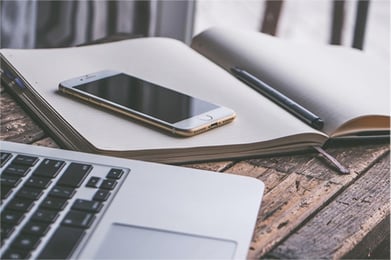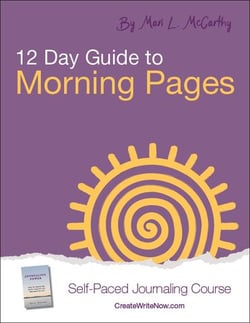 You wake up at the sound from your smartphone that gets louder until you push stop. While commuting to work you're listening to music streaming from your phone. You spend all day sitting in front of your computer doing your job. When you need to buy groceries, you use your smartphone to make a shopping list. And before you go to bed you check out your news feeds on social media.
You wake up at the sound from your smartphone that gets louder until you push stop. While commuting to work you're listening to music streaming from your phone. You spend all day sitting in front of your computer doing your job. When you need to buy groceries, you use your smartphone to make a shopping list. And before you go to bed you check out your news feeds on social media.
Books became digital. Emails and social apps replaced handwritten letters. And most of your writing is on your phone.
Unless you prefer journaling by hand, it would be hard for you to remember when was the last time you actually wrote something using a pen and paper.
We are deeply immersed in digital world. And it's not a bad thing. Technology makes our lives comfortable and convenient. Even journaling.
I know some of you would argue that journaling by hand is the right way to do it.
Julia Cameron, the author of the book "The Artist's Way" who coined the term Morning Pages – a daily journaling practice – makes this pretty clear:
"Typing Morning Pages may give us more speed — but will give us less depth. Writing by hand connects us more intimately to our thoughts, and paradoxically is more efficient in terms of getting in touch with ourselves and opening the path to our most authentic selves and the day at hand.”
You put more thinking when writing by hand than typing. There are studies that say writing by hand stimulates certain cells in your brain, and as a result you give more importance to the stuff that you’re actively focusing on at the moment.
But does this mean that it’s impossible to focus, express your feelings, be creative or come up with ideas when you type? Not quite.
If you grew up in a digital age like I did, and you're comfortable with using technology for coping with your life, than the practice of journaling with the help of a mobile app is something you might already be doing.
Despite the pen being mightier than the keyboard, how about we make a defense of journaling apps and list the benefits these tools provide?
6 things you can do with the help of mobile technology
1. Keep up with the writing habit
Journaling is something that you need to do on a daily basis. Regularly jotting down your thoughts improves your personal well being, and gives you time for self-reflection. The main benefit of using a mobile app for journaling is that it helps you keep up with a regular writing habit. Mobile apps can send you notifications reminding you to write every day. This is especially beneficial for aspiring writers who use journaling as a regular exercise to develop their own voice in writing.
2. Create backups of your journal
Some of your thoughts and memories that you pour on paper are very important to you. Of course you don't want to lose them. But a paper notebook can get lost pretty easily. Just like your smartphone. When you type, however, you can create backups of your journal and access what you've written from anywhere. You also don't have to worry about forgetting your notebook at home when you go on holiday. Your smartphone is always with you, and if you do forget it somewhere you can recover your entries. It's also easier to search for specific entries using digital tools.
3. Turn off notifications to eliminate distractions
Journaling requires a lot of mental energy. To focus on writing you need to cut out distractions. One of the biggest advantages of paper notebooks is that they don't interrupt writing. When you type on your computer or a mobile app, you get distracted by extraneous apps, emails, and notifications. However, you can always turn off notifications on your phone. If you prefer typing on a computer, you can use apps like Ommwriter that blocks off all the notifications you receive.
4. Print and share
If you read the book the "Artist's Way" where Julia Cameron introduces the term Morning Pages as a way of journaling, you should know that you aren't supposed to go back and re-read your pages. But if you don't follow this rule at all times, you might actually want to read what you wrote in a few days to see the situation from another angle. Also not all your daily writing might be a stream of consciousness. Sometimes you may use a journal to make plans for the day, think about a project, or draft some notes. With a mobile app you can export your pages into PDF, print them, and even share with somebody.
5. Keep your privacy
The real value of journaling comes with being open and honest with yourself. Since you're writing from your heart, you typically don't want anybody to read what you wrote. For journal writers privacy is often the most important concern. You can always hide your notebook from others. But this is not the best way to secure your entries. With an electronic journal you can better protect your privacy through passwords, and nobody will read your journal against your will.
6. Track progress
Journaling helps you get where you need to go. If you want to make journaling your daily practice, you need to keep track of your progress. It's pretty easy to do with a mobile app. With digital journaling you can track the number of words you write each day, and the number of days you spend journaling. You can see the progress you made on a calendar, which will also show you the days you missed. Visualizing your progress will motivate you to cope better with maintaining a good writing habit.
I use the MorningPages app for journaling. It's very simple and it has all the benefits that I described above. But what I especially like about this app is that it provides analytics of my text motivating me to write every day. These analytics include emotions, mood, and topics I write about. Keeping track of my emotions and mood helps me improve my mental health. I reflect on my experiences and gain insights into what triggers a certain emotion.
Although I have my favorite paper notebook for journaling, most of the time I use this mobile app. I highly recommend MorningPages for those of you who prefer journaling with their smartphones.
And what do you think about using digital tools for journaling?
 Author Bio:
Author Bio:
Kate Abrosimova is a writer, the co-founder of Kaiiax, a consulting firm for technology companies, and a member of a startup that builds MorningPages, an app for journaling and personal analytics. She loves writing and technology, and has a twin sister.
https://morningpages.co/
https://itunes.apple.com/us/app/morning-pages/id1223874080?mt=8
If you want to learn how journaling can help you tackle life's challenges, please download the free eBook, The Journaling Guide to Manage The Stress and Strains of Life.
A daily Morning Pages practice is a key component of better physical and mental health, greater energy, and an overall feeling of well-being. Our 12 Day Guide to Morning Pages self-paced journaling course isa a gentle introduction to this daily habit that will change your life.



Leave Comment